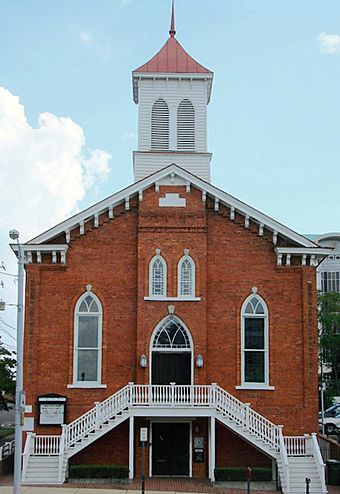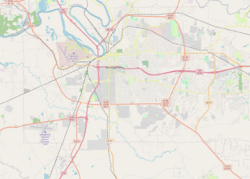Dexter Avenue Baptist Church facts for kids
|
Dexter Avenue Baptist Church
|
|

Dexter Avenue Baptist Church, 2000
|
|
| Location | 454 Dexter Avenue Montgomery, Alabama |
|---|---|
| Built | 1883–89 |
| Architectural style | Late Victorian |
| NRHP reference No. | 74000431 |
Quick facts for kids Significant dates |
|
| Added to NRHP | July 1, 1974 |
| Designated NHL | May 30, 1974 |
The Dexter Avenue Baptist Church is a special church located in Montgomery, Alabama, in the United States. It's a Baptist church that became very important in American history.
In 1974, the church was named a National Historic Landmark. This was because of its big role in the civil rights movement. This movement worked to make sure all people, especially African Americans, had equal rights.
Later, in 1978, the church's name was changed to the Dexter Avenue King Memorial Baptist Church. This was done to honor Dr. Martin Luther King Jr.. He was a pastor at this church and helped lead the famous Montgomery bus boycott in 1955. This boycott was a major event during the civil rights era.
The church is very close to the Alabama State Capitol building. Because of its important history, the United States government suggested in 2008 that the church be considered a World Heritage Site by UNESCO. It is currently on UNESCO's "Tentative List" for this special recognition.
Contents
History of Dexter Avenue Baptist Church
The Dexter Avenue Baptist Church started in 1877. It was founded by freedmen and free people of color. These were African Americans who were no longer enslaved or had always been free. At first, it was called the Second Colored Baptist Church.
Building the Church
On January 30, 1879, the church leaders bought a piece of land for $270. This land was at the corner of what is now Dexter Avenue and Decatur Street. The first church building was a small wooden one.
The church members began building a new, bigger brick church in 1883. It took several years to finish, and the building was completed in 1889.
Helping the Community
The church also played a big part in helping the wider African American community. On October 3, 1887, it hosted the very first student registration for Alabama State University. This university is a historically black college, meaning it was founded to educate African American students.
Important Pastors
Many important leaders served as pastors at Dexter Avenue Baptist Church.
- In 1899, William H. McAlpine became the pastor. He was also one of the people who helped start Selma University.
- Vernon Johns, an early leader in the Civil Rights Movement, was the pastor from 1947 to 1952.
- Dr. Martin Luther King Jr. became the pastor in 1954 and served until 1960. He worked from his office in the church basement. From there, he helped organize the 1955 Montgomery bus boycott. This boycott was a peaceful protest against unfair rules on city buses.
Nearby Historic Sites
Close to the church is the former Dexter Parsonage. A parsonage is a house where a pastor lives. This house was home to twelve different pastors of the church between 1920 and 1992. Today, it is the Dexter Parsonage Museum. It teaches visitors about the church's history. The church itself was added to the National Register of Historic Places in 1982.
Behind the church, you can find the Dexter Avenue King Memorial Legacy Center. It is located at 455 Washington Avenue. In its courtyard, there is a statue of Dr. King, honoring his legacy.
See also
- List of National Historic Landmarks in Alabama
- List of Baptist churches in Alabama
Images for kids








